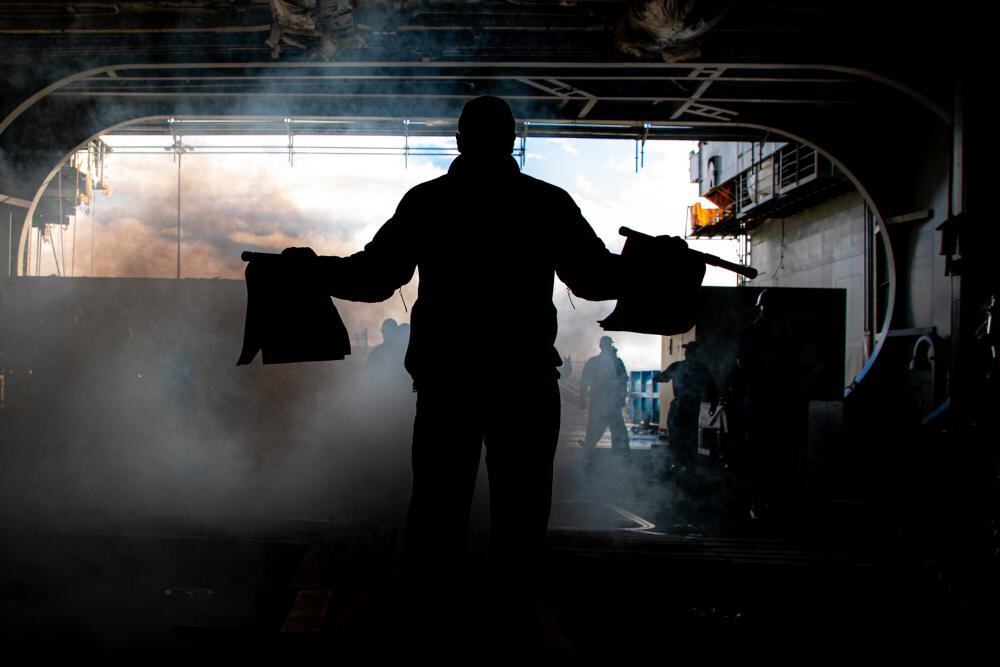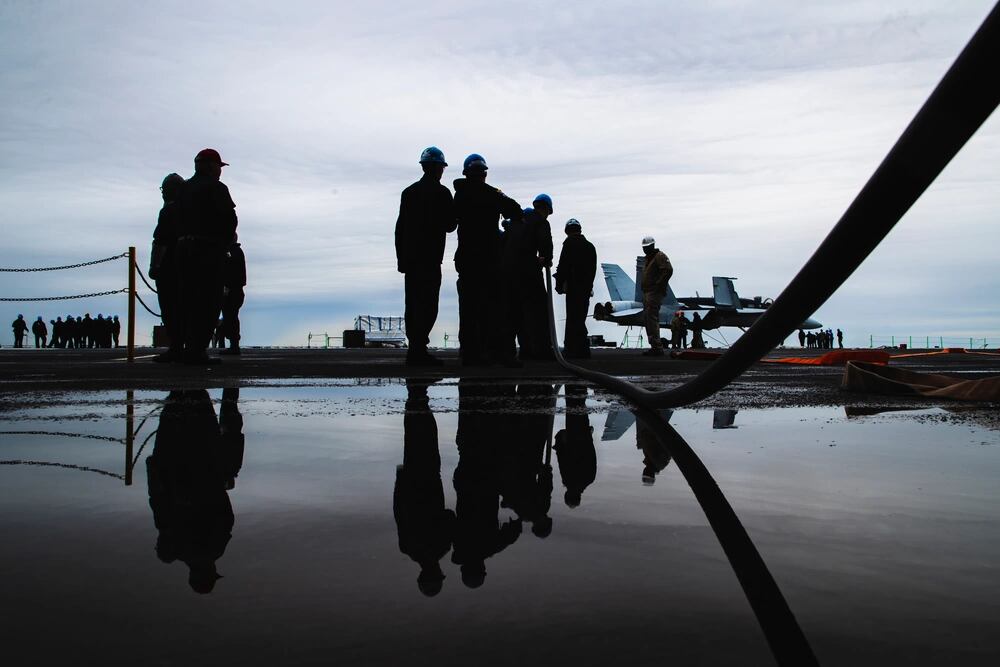The Navy is revamping manning requirements, living conditions and mental health access for sailors assigned to aircraft carriers undergoing maintenance in the shipyards, according to a quality of service investigation released by the service Thursday.
The reforms announced by the sea service come after a separate investigation into the rash of suicides among sailors assigned to the carrier George Washington revealed how the challenging work environment at a Newport News, Virginia, shipyard had negatively affected their quality of life.
The report presented 48 recommendations to the Navy, including beefing up mental health resources, improving parking options and other basic amenities, and executing manning shifts, among other items.
“We recognize many of the recommendations will require significant resourcing solutions, and we’re working through that process now with the full attention of the highest levels of Navy leadership,” Adm. Daryl Caudle, the head of U.S. Fleet Forces Command, told reporters Thursday. “Our actions going forward will speak to how seriously we take this issue, and we will not rest until we are certain that our Navy is providing the quality of service standards that our sailors and families deserve.”
Navy leaders didn’t cite specific target dates for implementing the recommendations, but Caudle said service leaders “didn’t sit on our hands” during the early phases of the GW investigation. They jumped in to improve mental health resources, remove sailors from the ship, provide better food options and make changes to parking.
“I’m extremely encouraged with the speed that they’re moving on this thing and how passionate they are about making meaningful change [for] our sailors,” Master Chief Petty Officer of the Navy James Honea told reporters Thursday.
The earlier investigation, released in December, found that three deaths over the course of six days in April 2022 were not related. However, the report also characterized the ship’s psychologist and the behavioral health technician as “overwhelmed,” and said sailors in need of help encountered a backlog of roughly four to six weeks for initial appointments.
That prompted Naval Air Force Atlantic’s launch of the quality of service investigation to evaluate ways to improve the quality of life for sailors assigned to aircraft carriers undergoing a mid-life refueling and complex overhaul, known as an RCOH. The George Washington has been undergoing its RCOH at Newport News Shipbuilding since August 2017 after being based in Yokosuka, Japan, for seven years.
The investigation determined that the working environment for sailors assigned to the George Washington during its overhaul was poor, and damaged efficiency and effectiveness. It also stymied the execution of quality of life programs.
There were too few supervisors to provide necessary training, mentorship and quality of life oversight for sailors, it found. In addition, accommodations provided by Huntington Ingalls Industries did not have the capacity for crews from two carriers — the GW and the Stennis —and did not meet Department of Defense standards. The crew’s move aboard the GW was also premature, according to the report.
RELATED

Within the crowded shipyard environment, sailors also had to cope with “disjointed and dispersed parking” with “episodic shuttle transportation” and long walks from the shipyard to the carrier.
The report advised the Navy to remove first-term sailors from an assignment to an aircraft carrier within one year of entering RCOH until after it comes out of the shipyard. This aims to reduce the number of sailors most at risk to quality of life challenges and also to eliminate strains on the chain of command.
“By reducing the number of first tour Sailors and optimizing the number of Sailors to the mission of RCOH, the Navy will effectively improve quality of life by reducing the support requirement to crew, freeing crew for other CVNs, and decreasing prolonged out-of-rate work and subsequent dissatisfaction,” the investigation said.
The report advised Program Executive Office Aircraft Carriers to conduct an analysis looking at more parking alternatives for sailors and other changes.
“Improving basic amenities, such as reducing distant parking challenges, providing convenient and available food options and offering fitness convenience and access, all centralized for basic efficiency and functionality, will increase the overall quality of life and quality of service for Sailors assigned to aircraft carriers during RCOH,” the report said.
The investigation also led to a call for the service to expand the number of medical mental health providers, advising the Department of Defense, the Navy and the chief of naval operations to “prioritize mental health clinician recruitment and retention to ensure adequate clinical services for all Sailors, particularly those assigned to aircraft carriers.”
Caudle said that immediately following the first investigation into the George Washington suicides, the Navy moved to improve mental health resources, including bolstering behavioral health technicians assigned to the carrier.
“We’re now trying to understand how to build that out more fully and to ensure that where the highest risk populations are, that we go after those areas first,” Caudle said.
But there are challenges, given that the Navy is competing with high demand in the civilian sector amid a national shortage of mental health care providers, he said.
“So, we’re working through mechanisms to ensure the compensation packages that we can offer in this [are] competitive in that space,” Caudle said.
RELATED

A total of 70 sailors died by suicide in 2022 — an increase from 59 suicides in 2021 and 65 in 2020, according to the Navy.
In January, Navy senior leaders acknowledged that suicides across the fleet are a major concern that they are attempting to address. Chief of Naval Operations Adm. Mike Gilday said at the Surface Navy Association conference in January that the issue is a “vexing” problem for the Navy, and current efforts to improve mental health are not sufficient.
“The connectedness between us and amongst us is really, critically important,” Gilday said. “The first line of defense even goes below chief petty officers in terms of understanding, or trying to understand, what’s going on in the day-to-day lives of our shipmates. And if anything, our message is, ‘Stick around. We need you. We can help you.’
“There are multiple ways that we can do it, yet it’s still a vexing problem because people still choose to take their lives,” he said. “And so I would tell you, that’s what keeps us awake at night.”
The George Washington, which was originally set to conclude its RCOH in 2021, is now expected to wrap up that maintenance this year. The carrier is set to return to Japan, replacing the aircraft carrier Ronald Reagan, which has served as the forward-deployed carrier since 2015.
Troops and veterans experiencing a mental health emergency can call 988 and select option 1 to speak with a VA staffer. Veterans, troops or their family members can also text 838255 or visit VeteransCrisisLine.net for assistance.





